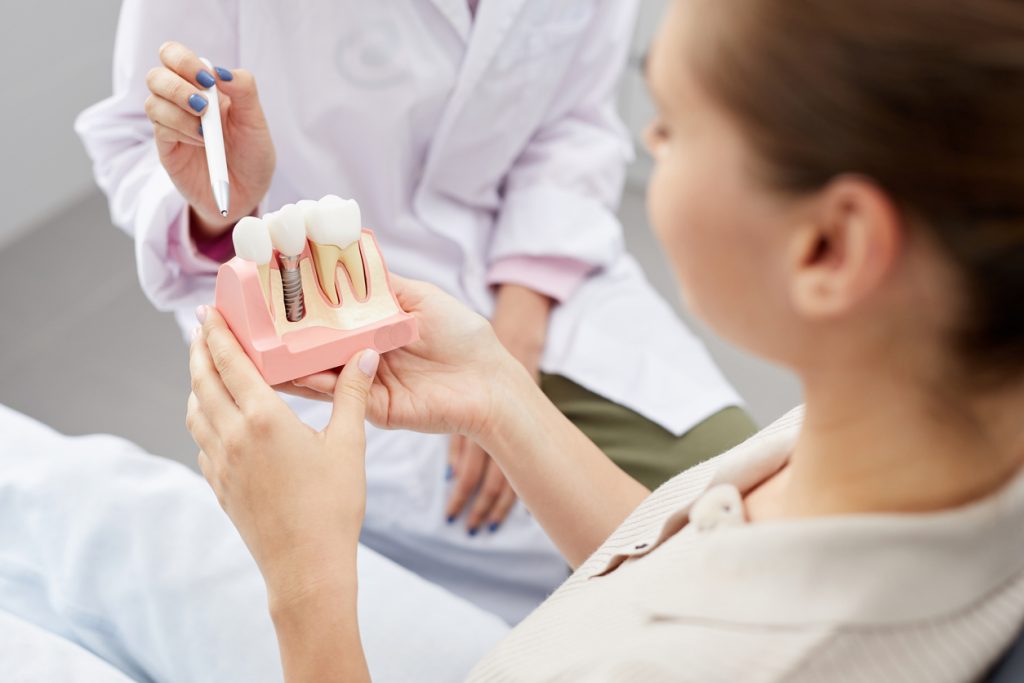Dental implants are revolutionizing restorative dentistry by providing a cutting-edge method for replacing missing teeth. Imagine a sleek titanium post seamlessly integrating into the jawbone, providing a rock-solid foundation for teeth that look, feel, and function like the real deal. This remarkable technology outshines traditional dentures and bridges, providing not just stability but also the confidence of a natural-looking smile.
For those weighing the benefits, having the knowledge of the longevity of dental implants is key—they can dramatically improve not only your appearance but also your quality of life with the right care. With proper maintenance and care, it can last a lifetime, although the attached crown or prosthetic may need replacement after 10 to 15 years due to normal wear and tear.
Understanding the Dental Procedure
Step 1: Patient Consultation and Evaluation
The dentist or oral surgeon conducts a thorough examination of your oral health. Your medical history, medications, and lifestyle are discussed to tailor the treatment plan.
Step 2: Pre-Surgical Preparations
Based on the initial evaluation, a personalized treatment plan is created. If necessary, preliminary procedures such as tooth extraction or bone grafting might be scheduled to prepare the surgical site.
Step 3: Bone Grafting (If Required)
When the jawbone lacks density, bone grafting is performed to enhance its volume and strength. Healing may take weeks to months for integration before implant placement.
Step 4: Teeth Crown Placement
Local anesthesia or sedation minimizes discomfort. An incision is made, and a titanium post is inserted into the jawbone, followed by stitching the gum and possibly placing a temporary crown or healing cap.
Step 5: Healing Treatments and Osseointegration
Over several months (typically 3-6 months), the implant fuses with the jawbone in a process called osseointegration. This period is important as it establishes stability and mimics the natural tooth root’s function.
Step 6: Abutment Placement
After osseointegration, a minor procedure attaches an abutment to the implant. The gum heals around this connector.
Step 7: Crown Fabrication and Fitting
Mouth impressions are taken to design a custom dental crown matching the natural teeth. The crown is then attached to the abutment, completing the restoration.
Step 8: Post-Procedure Care and Maintenance
The dentist provides instructions on oral hygiene practices and any dietary restrictions during the healing process. Regular follow-up appointments are scheduled to monitor healing and establish stability.
The Lifespan of Dental Implants
Dental implants are designed to be a long-lasting solution intended to serve as a permanent replacement for missing teeth. The success rate is quite high, contributing to their popularity as a reliable option for tooth replacement. However, the crown, which is the visible part attached to the implant, may experience wear over time and could require replacement. Regular use and normal wear and tear can affect the crown’s durability, leading to the need for replacement in many cases.
In fact, statistics suggest that around 50 to 80 percent of crowns may need to be replaced within 15 to 20 years. Despite this, the foundation typically remains strong and secure, maintaining the functionality of the replacement tooth and reaffirming the success rate of dental implants.
Factors Influencing It’s Longevity
Oral Hygiene
Maintaining excellent oral hygiene is paramount for the longevity of dental restorations, including dental implants. Regular brushing, flossing, and the use of antibacterial mouth rinses can effectively minimize plaque buildup, which, in turn, reduces the risk of gum disease and peri-implantitis. Adhering to proper oral hygiene habits is essential, as failure to do so can lead to infections and inflammation that jeopardize the integrity of the tooth replacement.
Lifestyle Choices
Lifestyle choices, such as smoking and excessive alcohol consumption, can significantly affect the lifespan of dental implants. For instance, smoking reduces blood flow to the gums, impairing healing and increasing the risk of dental implant failure rate. Moreover, a balanced diet rich in essential nutrients supports tissue health and bone density, both of which are critical for the stability and success of dental restorations. Oral surgeons often emphasize the importance of a healthy lifestyle to support recovery and longevity.
Bone Health
The success heavily relies on the quality and density of the jawbone where it is placed. Medical conditions such as osteoporosis or significant bone loss can undermine the stability of the implant, often necessitating preliminary procedures like bone grafting by oral surgeons to establish a strong foundation. Establishing sufficient bone health is vital, as it supports osseointegration, the process by which the implant fuses with the jawbone, thus securing its longevity.
Regular Dentist Check-Ups
Consistent dental check-ups from trusted dental offices like Mann Family Dental are vital for monitoring the health of dental implants and detecting potential issues early. During these visits, dentists can perform professional cleanings and evaluate the condition of the tooth replacement and surrounding tissues, making sure dental hygiene is maintained. Early intervention in cases of infection, tissue inflammation, or other complications can help preserve the integrity and functionality over time.
Material and Technology
The materials used for the implant play a significant role in its durability and integration with the bone. Titanium is a common choice due to its biocompatibility and strength, but advancements in materials, such as zirconia, are also being explored. High-quality implant materials resist corrosion and wear, establishing long-term performance.
Additionally, the technology and techniques used in implant placement, such as computer-guided surgery, can enhance precision and outcomes, potentially increasing the implant’s success and lifespan.
Patient’s Overall Health and Medical Conditions
A patient’s general health significantly impacts the healing process and the longevity of dental implants. Conditions like diabetes, autoimmune diseases, and other systemic health issues can hinder the healing process and osseointegration, affecting implant stability. Properly managing these conditions and working closely with healthcare providers can mitigate risks and improve outcomes.
Also, certain medications, particularly those affecting bone density, might require special considerations during the implant planning and maintenance phases.
Benefits of This Dental Procedure Over Other Options
- Longevity and Durability. Designed to last for many years, often exceeding the lifespan of traditional dentures or bridges when properly cared for. Made from strong materials like titanium, they integrate with the jawbone, providing a resilient and stable foundation.
- Improved Appearance. Closely mimic the appearance of natural teeth, providing a seamless and natural-looking smile. Custom-made crowns make sure that they blend well with surrounding teeth in color, shape, and size.
- Enhanced Oral Functionality. Restore full chewing ability, allowing for a varied diet without the worry of dentures slipping or limiting food choices. They function like natural teeth, improving speech and eliminating the lisp or discomfort often associated with dentures.
- Bone Health Preservation. By integrating with the jawbone, dental implants stimulate bone growth and prevent bone loss, which can occur with missing teeth. This helps maintain facial structure and prevents the sunken appearance sometimes caused by tooth loss.
How Can You Make Your Tooth Replacement Last Longer?
Consistent Oral Hygiene
Maintaining a rigorous oral hygiene routine is crucial for the longevity of dental implants. Regular brushing, flossing, and the use of antibacterial mouth rinses help prevent plaque buildup and reduce the risk of infections that can compromise the implant.
Regular Dental Check-Ups
Scheduling regular check-ups with an implant dentist ensures that any potential issues, such as periodontal disease or inflammation, are identified and addressed early. Professional cleanings and examinations provide ongoing monitoring that supports the implant’s health and longevity.
Protective Measures in High-Risk Activities
Engaging in contact sports or activities with a higher risk of oral injury should be done with appropriate protective gear, like mouthguards. Taking these precautions can help prevent physical damage to the implant, thus prolonging its lifespan.
Addressing Underlying Health Conditions
If you have any underlying medical history or autoimmune diseases, discuss these with your dental provider to tailor a comprehensive dental care plan. Certain conditions may affect bone health and healing, so proper management is essential for implant success.
Healthy Lifestyle Choices
Avoiding smoking and excessive alcohol consumption is important as these can negatively impact gum health and the healing process. A balanced diet rich in essential nutrients supports overall oral health, contributing to the stability and success of dental implants.
What Happens If You Have Implant Failure?
If a dental implant fails, it typically means that osseointegration—the process by which the tooth replacement fuses with the jawbone—did not occur as expected or it encountered complications like infection or excessive stress. This failure can lead to discomfort, instability, and eventual loss of the implant.
Early detection through regular dental check-ups is critical, as it may allow for intervention and corrective measures, such as addressing infections or considering bone grafting. If a replacement is necessary, a thorough evaluation will be conducted to assess the condition of the jawbone and overall oral health before proceeding with any additional treatment.
Make a Difference to Your Smile: Contact Us to Learn More
Dental implants offer a durable, aesthetically pleasing remedy for tooth loss, with a high survival rate when cared for properly. Whether you’re considering it for the first time or seeking a reputable dentist for ongoing support, knowing their benefits and maintenance is essential.
If you’re considering dental implants or need ongoing dental care, look no further than Mann Family Dental. Our team is dedicated to providing personalized treatment plans that confirm both the longevity and success of your dental restorations. At Mann Family Dental, we combine expertise, advanced technology, and compassionate care to deliver exceptional outcomes that enhance your quality of life.
Call us today for a consultation and take the first step towards restoring your smile with confidence.






